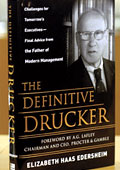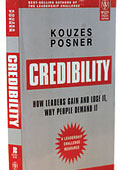 |
THE DEFINITIVE DRUCKER
By Elizabeth Haas Edersheim
McGraw-Hill
Pp: 256
Price: Rs 1,230 |
Much before the present
day management gurus arrived on the scene, armed with their exclamation
marks and superlatives, there was one man who had said and written
pretty much everything one needs to know about management. He
didn't set out to become a management guru (in fact, he hated
that description); all he wanted was to become a writer (his stint
as an investment banker was perhaps an aberration), and he did
so, moving to the United States as a correspondent for the Financial
News (as the Financial Times was called then). And when General
Motors hired him to investigate what goes into the making and
running of a modern corporation, he wasn't even experienced in
business. His first book had been on politics and economics of
the 1930s. But such was the genius of Peter Drucker that his first
book on management The Concept of the Corporation, produced in
1946, proved to be way ahead of its time. In it, Drucker, born
in Vienna in 1909, talked about concepts that were to become business
buzzwords only decades later-things like empowerment, corporate
social responsibility, and human capital.
In the decades that followed, Drucker continued to churn out
path-breaking work, including books such as the Practice of Management
(1954), The Age of Discontinuity (1969), and Managing in Turbulent
Times. No wonder, almost everyone considers him the father of
modern management. But what does The Definitive Drucker offer
that the man's own writings and those of others on him don't?
The publishers of the book have chosen to describe it as the "final
advice from the Father of Modern Management". It's a factually
correct description of the book, and not just a clever marketing
line. The book was written at the invitation of Drucker, who asked
the writer, a former McKinsey consultant, to focus not on him
and his achievements, but his ideas. So, over a 16-month period
(until Drucker died in November 2005), Edersheim spent two hours
every day at his home in Claremont near Los Angeles, discussing
and debating about some of his most important ideas. In the words
of the author, "I wanted to distill his ideas into a practical
handbook about how to help organisations thrive as their traditional
ways of doing business are overturned."
And distill Edersheim has. She has packaged Drucker's most important
insights into five themes, involving customers, innovation, collaboration,
talent management, and disciplined decision-making. No doubt,
you would have encountered a lot of it in The Essential Drucker,
but in this book, Drucker has given Edersheim the freedom to interpret
his views from a new perspective. Therefore, you will find the
author's own voice intermingling with that of the management giant.
If you are a Drucker fan-and it's hard to imagine how you can't
be one-The Definitive Drucker will be the last piece of advice
you receive directly from the man himself.
 |
|
CREDIBILITY
By James M. Kouzes and
Barry Z. Posner
Jossey-Bass
Pp: 342
Price: Rs 399
|
Credibility is such an important
quality in a leader that it's impossible to think that a leader
could exist without it (unless, of course, your dad owned the
company). A leader becomes a leader only because people choose
to follow him or her; if Mahatma Gandhi had not seemed credible
in his bloodless fight against the British empire, then few would
have followed his path. Independence may have come at a much larger
cost of lives-indeed, if it came at all. So, why would anyone
want to write a book to state the obvious? Apparently, to sink
a hand into this formidable-sounding, but amorphous, quality called
credibility, and put a finger on its key constituents. What do
the authors come up with? The fact that character counts, that
things work on trust, and that, among others, leadership is a
dialogue, not a monologue.
It's an appropriate time to be talking about these issues, especially
in India. As small companies grow big, and the big ones get bigger,
there's a desperate need to create leaders at different levels
of the organisation. Senior executives need to pull middle managers
to their own competency levels, while the middle and junior managers
have to turn raw talent into a competitive asset. Aspiring leaders
will find plenty to take away from Kouzes and Posner's work.
|






